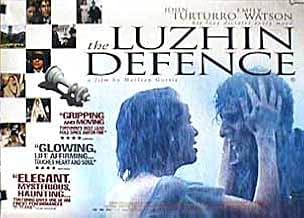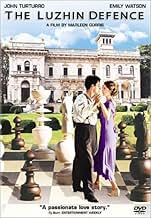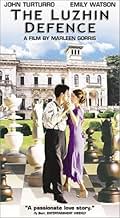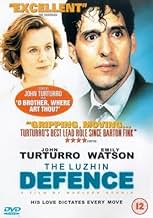AVALIAÇÃO DA IMDb
6,8/10
4,9 mil
SUA AVALIAÇÃO
Adicionar um enredo no seu idiomaTwo worlds collide when an eccentric genius falls in love with a strong-willed society beauty.Two worlds collide when an eccentric genius falls in love with a strong-willed society beauty.Two worlds collide when an eccentric genius falls in love with a strong-willed society beauty.
- Prêmios
- 3 vitórias e 2 indicações no total
- Direção
- Roteiristas
- Elenco e equipe completos
- Produção, bilheteria e muito mais no IMDbPro
Enredo
Você sabia?
- CuriosidadesThe dramatic draw that takes place halfway through the film follows the obscure game Macht-Weenink 1930. The scene begins as Luzhin's opponent is in a losing position. Knowing he is ahead but with pressure mounting, Luzhin makes the amateur-grade blunder from the original game. He loses his knight for nothing. Having blown his chance to win, Luzhin forces a draw.
- Erros de gravaçãoIn his game as white against an unnamed opponent before the final, Luzhin is shown supposedly checkmating with Rd1-d8, which is an illegal move because his rook at d1 is pinned against his king on h1 by black's rook at c1.
- Citações
Aleksandr Ivanovich Luzhin: There's a pattern emerging, a definite pattern. Not Turati. I repeat that game. I've beaten him. And his moves are repeated, repeated, repeated moves. I must keep track... of every second. Every second I must keep track of, every second.
Natalia Katkov: It sounds like such a lonely battle.
- Trilhas sonorasJazz Suite No. 2: VI. Waltz 2
Written by Dmitri Shostakovich (as Dimitri Shostakovich)
Performed by Koninklijk Concertgebouworkest (as Royal Concertgebouw Orchestra)
Conducted by Riccardo Chailly
By permission of Boosey & Hawkes Licensing
Courtesy of Decca Record Label Ltd.
Under license from Universal Special Markets
(p) 1992 Decca Records
Avaliação em destaque
John Turturro, Emily Watson, Geraldine James, Stuart Wilson; directed by Marleen Gorris, loosely based on the novel by Vladimir Nabokov The Luzhin Defence is set in nineteen-twenties Italy's lake district where the world championships of Chess are being staged. Our hero Luzhin (Turturro) is a main contender for the title and recognized as one of the greatest chess minds of the era. He is utterly consumed by game, and has utterly devoted his life to the contest since a young age. It has been both obsession and addiction for the man, as it is both all he knows and what gives his life meaning. While competing in the championships, he meets Natalia (Watson), a wealthy socialite. Showing his peculiarity, he immediately asks her to marry him, sight unseen. Intrigued by his straight forward manner, she does not immediately dismiss him.
This is due to the fact that she is here for her mother to choose a suitor for her, and Luzhin's eccentricity is seen by her as a welcome change. Her mother (James) is completely taken aback by such an idea, and wants her daughter to marry someone of similar prestige and means. All of this transpires while his old chess teacher (Wilson) tutors his chief rival, wanting nothing more than to see Luzhin humiliated.
Being a chess movie, it could immediately be set aside as dull and unwatchable, being as Chess is not exactly a spectator sport.
However, this movie is much less about chess and much more about the people surrounding the game; making it a piece about the interactions of personalities and not pieces. The movie does find a parallel however, as it is shown like a chess match between two sides, the present and the past (shown through flashbacks), with one side prevailing at the end. This storytelling choice works surprisingly well, as we gain much insight as to why Luzhin is the way he is, and how he views the world.
The movie begins with a telling piece of cinematography, as the audience is given the perspective of a train conductor emerging from a tunnel. This is especially significant when viewed in the sense of Luzhin's later mental breakdown, and can be seen as meaning the same thing. This scene is then segued into the first flashback, giving us a pattern that can be seen in the rest of the film. Other notable scenes include the meeting of Natlalia and Alexander at a tennis court, and later when he is thinking to himself in their bedroom, "There is a pattern emerging!" cries the eccentric chess genius Alexander Luzhin. "I must keep track--every second!" To which Natalia, whom he loves can only reply, "It sounds like such a lonely battle.' This all encompassing effect of chess on him can also be seen earlier in the film, as he is being driven by one of his old chess teachers chauffeurs into the middle of the countryside, is dropped off there, and does not notice. The end adds character to the film without being overly dramatic, but is a departure from the finish of the novel, however it is believable and adds to the sense that Luzhin does not really control himself, or know how.
Overall an enjoying piece of film, more about camera angles and people then chess. After the first half, the films pace drastically speeds up, and the plot becomes much more intriguing. Can best be compared to other independent films of its ilk, yet also suffices quite well as a period piece. Probably not a buy, but a worthy rental for an evening at home.
This is due to the fact that she is here for her mother to choose a suitor for her, and Luzhin's eccentricity is seen by her as a welcome change. Her mother (James) is completely taken aback by such an idea, and wants her daughter to marry someone of similar prestige and means. All of this transpires while his old chess teacher (Wilson) tutors his chief rival, wanting nothing more than to see Luzhin humiliated.
Being a chess movie, it could immediately be set aside as dull and unwatchable, being as Chess is not exactly a spectator sport.
However, this movie is much less about chess and much more about the people surrounding the game; making it a piece about the interactions of personalities and not pieces. The movie does find a parallel however, as it is shown like a chess match between two sides, the present and the past (shown through flashbacks), with one side prevailing at the end. This storytelling choice works surprisingly well, as we gain much insight as to why Luzhin is the way he is, and how he views the world.
The movie begins with a telling piece of cinematography, as the audience is given the perspective of a train conductor emerging from a tunnel. This is especially significant when viewed in the sense of Luzhin's later mental breakdown, and can be seen as meaning the same thing. This scene is then segued into the first flashback, giving us a pattern that can be seen in the rest of the film. Other notable scenes include the meeting of Natlalia and Alexander at a tennis court, and later when he is thinking to himself in their bedroom, "There is a pattern emerging!" cries the eccentric chess genius Alexander Luzhin. "I must keep track--every second!" To which Natalia, whom he loves can only reply, "It sounds like such a lonely battle.' This all encompassing effect of chess on him can also be seen earlier in the film, as he is being driven by one of his old chess teachers chauffeurs into the middle of the countryside, is dropped off there, and does not notice. The end adds character to the film without being overly dramatic, but is a departure from the finish of the novel, however it is believable and adds to the sense that Luzhin does not really control himself, or know how.
Overall an enjoying piece of film, more about camera angles and people then chess. After the first half, the films pace drastically speeds up, and the plot becomes much more intriguing. Can best be compared to other independent films of its ilk, yet also suffices quite well as a period piece. Probably not a buy, but a worthy rental for an evening at home.
- lancer0410
- 27 de mai. de 2004
- Link permanente
Principais escolhas
Faça login para avaliar e ver a lista de recomendações personalizadas
- How long is The Luzhin Defence?Fornecido pela Alexa
Detalhes
- Data de lançamento
- Países de origem
- Idiomas
- Também conhecido como
- The Luzhin Defence
- Locações de filme
- Budapeste, Hungria(St Petersburg scenes)
- Empresas de produção
- Consulte mais créditos da empresa na IMDbPro
Bilheteria
- Faturamento bruto nos EUA e Canadá
- US$ 1.053.070
- Fim de semana de estreia nos EUA e Canadá
- US$ 63.203
- 22 de abr. de 2001
- Faturamento bruto mundial
- US$ 1.873.620
- Tempo de duração1 hora 49 minutos
- Cor
- Mixagem de som
- Proporção
- 1.85 : 1
Contribua para esta página
Sugerir uma alteração ou adicionar conteúdo ausente

Principal brecha
By what name was O Último Lance (2000) officially released in India in English?
Responda





























